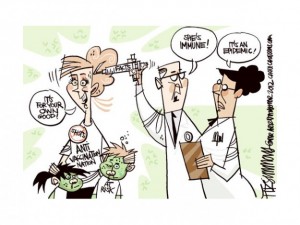Applying ethical principles to the medical field has proven complex, as highlighted by James Childress in his writings on the complexities of adhering to respect for personal autonomy.[1] The philosophical discipline of bioethics is not narrowly tied to medicine, but expands to cover medical anthropology, medical sociology, health politics, health economics, research, public health policy, and more.[2] Public health aims at improving the health of the community as a whole, and public health initiatives usually involve preventative measures that prolong life and promote health. Generally, public health policy concerns itself with health based on population-level health analysis. Thus, how do ethical principles change when the policy is focused on net benefit for the community, instead of focusing on individual community members?
Concentration on the group needs and health leads to thinking that often forgets about individual rights, but ethical principles of the individual need to be remembered when applying public health policies. Historically, individual rights are becoming increasingly recognized, and in the medical field, consent is a twentieth-century phenomenon.[3] As medicine increasingly recognizes individual rights, it is a logical extension for public health as a discipline to acknowledge analogous rights.
In bioethics, consent is rooted in the ethical principle of respect for personal autonomy, but this principle is complex and limited in application. Childress in “The Place of Autonomy in Bioethics” presents the scope of applicability of the principle of autonomy in medicine. He argues that first and foremost respect for autonomy of persons differs from people who are not autonomous such as children (unspecified age range) and the insane. Also, respect for autonomy must coincide with other necessary ethical principles such as beneficence and care, and in certain circumstances, ethical principles can outweigh or override one another. Thus, under certain circumstances the principle of respect for personal autonomy may be infringed upon, and specifically, the realm of public health needs to consider if policies made for the benefit of the group reasonably infringe upon the personal autonomy of group members.

This past September, 750 students in Winston-Salem, NC faced suspension after not adhering to state vaccination policies for the Tdap vaccination that protects against tetanus, diphtheria and whooping cough or pertussis.[4] Cases of mandatory vaccinations represent paternalistic interventions where interference with an individual’s liberty may be justified by reasons such as welfare, happiness, values, interests, and needs of the person being coerced. Mandatory vaccination initiatives are public heath measures that override rights of respect for personal autonomy for the sake of containing and preventing infection and disease. In context to this case, paternalism functions off the principle of beneficence. Mandatory vaccinations highlight the conflicts between moral principles, and under these circumstances, I think beneficence overrides each group member’s autonomy. While privacy and confidentiality can still be protected, controlling the spread of disease and preventing illness in community members is a moral call to action for vaccination. While it may be easier to fully respect the autonomy of an individual patient than an entire population, public health policy still should not deprive individuals of their rights without thoughtful consideration. Following Childress’s logic, are all group members considered equally autonomous thus infringement upon personal autonomy is the same? Or, based on group status does infringement on personal autonomy have different implications? In modern times, awareness of personal rights is increasing within bounds; therefore, it is important for public health to grasp and debate these ethical concerns. A new interpretation could view mandatory consent as a prior consent based on group membership, and thus interference is the price of group membership.[5] Such a viewpoint believes that the individual’s interests are still considered, but an individual is accepting his or her role as a group member. Future public health policies could work to understand the line between respect for personal autonomy and social responsibility, and from there, public health can define its realm of action and control.
[1] Childress, J. F. “The Place of Autonomy in Bioethics”
[2] Benatar, D. Bioethics and health and human rights: a critical view. Journal of Medical Ethics. 2006 January; 32(1): 17-20. http://www.ncbi.nlm.nih.gov/pmc/articles/PMC2563274/
[3] Veatch, R. M. “Abandoning Informed Consent”
[4] http://www.journalnow.com/news/local/article_b770c0ca-2484-11e3-93a9-001a4bcf6878.html
[5] Hall, Spencer. Should public health respect autonomy? Journal of Medical Ethics. 1992. 18: 197-201.
